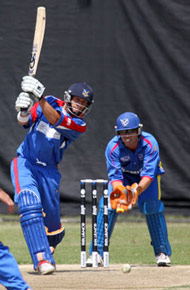
For the bottom two sides in the Super Eights, the United Arab Emirates and Namibia, there may be compensation in the form of continued participation in the Intercontinental Cup, but for those who dropped out after the group phase, it's back to Divisions 2 and 3 of the World Cricket League.
The UAE relied heavily on a small number of players: Saqib Ali was one of the classiest batsment on show, and skipper Khurram Khan and Nithin Gopal both played significant innings, Khurram's 120-ball 124 in the final match enabling his side to claim seventh place.
Allrounder Amjad Javed and his fellow-seamer Zahid Shah took 23 wickets between them; Zahid's performances against Afghanistan and The Netherlands were crucial in taking the UAE into the Super Eight phase, but the spinners generally found conditions not to their liking.
Widely fancied before the tournament began, Namibia had a disastrous group phase, losing four out of five and only sneaking into the Super Eights courtesy of an extraordinary run chase by Oman to deny Uganda fourth place in the group table. They did a little better at the second stage, but lost to Afghanistan to finish bottom of the table and were then beaten by the UAE to confirm their eighth placing.
The batting was extremely inconsistent: allrounders Gerrie Snyman and Sahel Burger and opener Raymond van Schoor made three half-centuries each and Niklaas Scholtz hit four in only seven innings, but apart from Jan-Berrie Burger's 125 which set up the overwhelming victory over Kenya – far and away Namibia's best performance of the competition – no-one played a really big, match-winning innings.
Louis Klazinga, who shared the new ball with Snyman, was the leading wicket-taker with 17, and he and Sahel Burger showed what they were capable of in bowling Kenya out for 104. These three claimed 42 wickets between them, but the rest of the attack made little impression.
Of the four sides which failed to make the Super Eights, it was Bermuda who were the heaviest losers, dropping out of the top six with its High Performance funding and ODI status.

Without David Hemp's three centuries, including a remarkable not-out, 141-ball 170 against Uganda, things would have been even worse, and only he and Stephen Outerbridge were able to show any degree of consistency with the bat.
Off-spinner Rodney Trott was the pick of the bowlers on generally unsympathetic pitches, but with seamer George O'Brien able to play only three games because of injury, the attack was well below par.
Uganda began with a shock win over Namibia on the opening day, but they lost all their remaining group matches, and missed out on the Super Eights when their bowlers were unable to defend a total of 298 against Oman.
With star allrounder Kenneth Kamyuka struggling for fitness, much devolved on Frank Nsubuga and skipper Junior Kwebiiha, and they responded with a reasonable degree of success. But it was veteran Nehal Bibodi who registered the steadiest performance, with a half-century when he came into the side against Oman, followed by centuries against Denmark and Bermuda in the play-off phase.
Oman were always off the pace, winning only that match against Uganda and the wooden spoon play-off against Denmark, but their batsmen produced some of the most explosive and entertaining innings of the entire tournament.
The most extraordinary was probably Farhan Khan's 95 from 49 balls, with 10 fours and 7 sixes, which was the key to the win over Uganda, but it was run close by Maqsood Hussain's 70 off 30 balls against Scotland. The latter's 20 off six balls against Bermuda (five fours and out!) was equally striking in its own way.
The Omani bowling and fielding failed to live up to these performances, however, and overall the side was clearly out of its depth.
The same applied to Denmark, who went through the tournament without a single win in seven matches.
With skipper Freddie Klokker suffering from an injured hand and unable to bat or keep wicket to the best of his undoubted ability, it was largely left to brothers Michael and Carsten Pedersen to carry the batting.
Again, it was the Danish bowling which really struggled, hampered by injury to left-armer Thomas Hansen, who played in only two games.
Like Oman, the Danes will now drop down to Division 3 of the World Cricket League, and will have some major rebuilding to do if they are to reach the next World Cup qualifier in 2013.